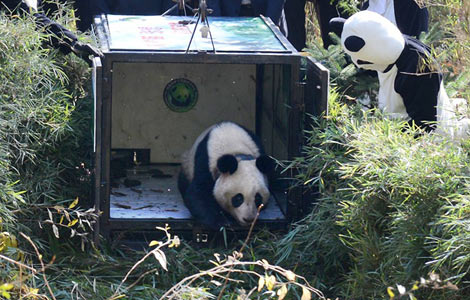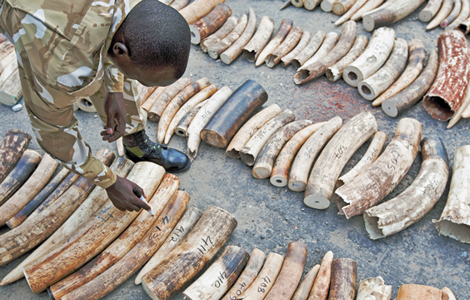US, China team up for wildlife
Updated: 2013-11-07 07:33
By DENG XIANLAI (China Daily USA)
|
||||||||
The US and China, the world's two largest markets for wildlife products, are joining efforts to combat wildlife trafficking — one of the most lucrative forms of transnational organized crime — which generates an estimated $7 billion to 10 billion annually.
While the US portrays itself as a leader in stopping the killing of endangered species worldwide, it also recognizes that this is a global issue that calls for international partnerships, according to US officials.
"I think we have good discussions going on with China and we are looking forward to continuing them," Kerri-Ann Jones, assistant secretary of state for oceans and international environmental and scientific affairs, said during a news briefing in Washington on Tuesday. "We are also looking forward to really thinking about the steps we can take that will make a difference."
On the same day in Beijing, Chinese Foreign Ministry spokesman Hong Lei was questioned at a news briefing about the three Chinese citizens arrested in Tanzania who had a considerable amount of ivory stock-piled in their residence. Hong said China firmly opposes ivory smuggling and will continue to work with the international community to protect wildlife.
According to media reports, a total of 706 elephant tusks weighing nearly two tons were found last Saturday in Dar es Salaam, Tanzania, in the house of three Chinese garlic traders. The case follows a recent report by Agence France-Presse that a Chinese man was arrested in October at Zimbabwe's main airport trying to smuggle ivory out of the country
China, among other Asian countries, has deep cultural ties to ivory, a commodity that is associated with status and prosperity and is often carved into delicate works of artistic ornamentation.
China's General Administration of Customs told the media recently that it cleared up an ivory smuggling case in which 2,154 elephant tusks weighing 8 tons were confiscated. The case was the biggest of its kind ever in China.
One of the hottest destinations for smuggled wildlife body parts is Xiaman, a city in Southeast China's Fujian province which is historically the ancestral home of many overseas Chinese doing business in Southeast Asia, an area where ivory trafficking is rampant. According to statistics from Xiamen Customs, two ivory smuggling gangs were caught in the past two years, with 13 tons of elephant tusks and ivory products worth nearly $100 million seized.
"The Chinese government firmly opposes elephant poaching and ivory smuggling and has taken appropriate measures, including new laws, integrated law enforcement and international cooperation," Hong said.
Facing a worldwide trafficking of endangered species that is becoming very sophisticated, highly organized and syndicated, China has joined the international community to strengthen cooperation.
At the Convention on International Trade in Endangered Species in Bangkok, Thailand this March, China accepted a joint proposal offered by the US on Asian turtle conservation, which marked the first ever proposal of its kind between the two countries.
"I think that reflects a growing recognition that the US and China as two leading economic powers in the world need to work together if we are going to achieve conservation for [endangered] species," said Dan Ashe, director of US Fish and Wildlife Services, who also attended the news briefing in Washington.
In Washington in July, US Under Secretary of State for Economic Growth, Energy and the Environment Robert Hormats and Zhao Shucong, head of the Chinese State Forestry Administration, met to discuss illegal wildlife trafficking and review the two countries' efforts to combat it.
"In recognition of the economic and security consequences of the burgeoning illicit trade networks, the two nations committed to pursue more effective mechanisms for cooperation," the State Department announced.
"The US is working in conjunction with its foreign partners — like China, Thailand, Vietnam, and countries where people are seeing this large and growing demand for these species — to reduce the demand for the illicit wildlife products," said Ashe.
Acknowledging that bilaterally the two countries had "talked quite a bit", Jones mentioned that the US also had a memorandum of understanding with China on the logging issue, which was "often linked to wildlife trafficking because…you are really talking about the habitat where you find these wonderful animals".
Most Viewed
Editor's Picks

|

|

|

|

|

|
Today's Top News
World to see boom in big firms
U. Michigan gets grant for China center
Lead author of Obamacare law blames govt for rollout
China's increasing role in global nuclear power
US companies in China feel squeeze
Panda cub drawing votes for her name
US, China team up for wildlife
E China still top draw for foreigners
US Weekly

|

|















